Demolition Contractors North Lebanon
Top 10 Building Demolition in North Lebanon
Receive multiple Demolition Contractor quotes for your project today! Compare profiles, reviews, accreditations, portfolio, etc... and choose the best offer.
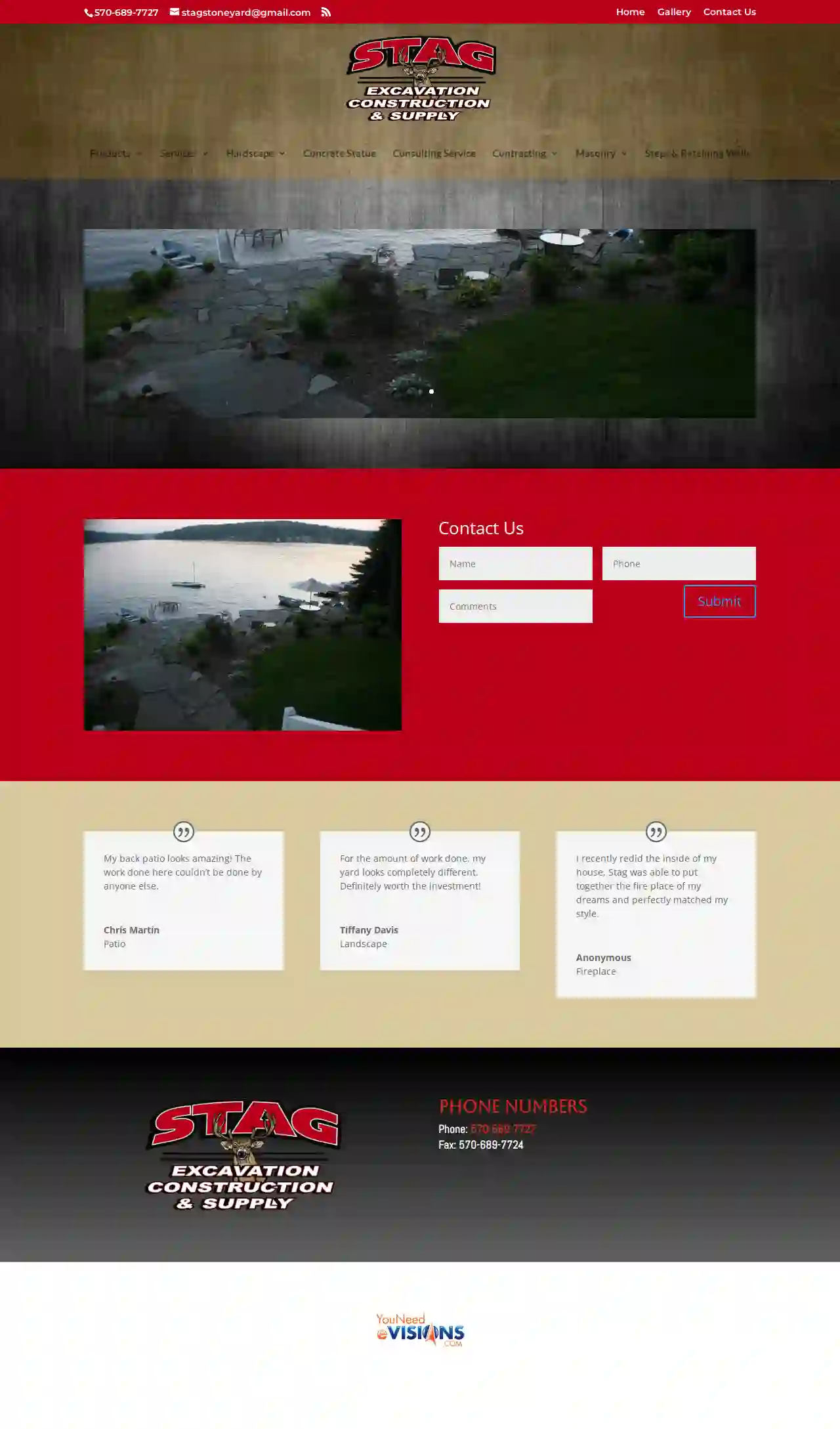
Stag Excavation Construction & Supply
52 reviewsHamlin, USStag Excavation & Stone Yard Stag Excavation & Stone Yard is a family-owned and operated business serving the Hamlin, PA area. We offer a wide range of services, from excavating and demolition to hardscaping and custom home construction. We are committed to providing our clients with high-quality workmanship and exceptional customer service. Our team of experienced professionals is dedicated to exceeding your expectations and delivering projects on time and within budget. We are proud to be a trusted name in the community and look forward to serving your needs. We are located just outside of Hamlin Corners in Hamlin PA. We offer free estimates on all of our services. Contact us today to schedule a consultation.
- Services
- Why Us?
- Testimonials
- Gallery
Get Quote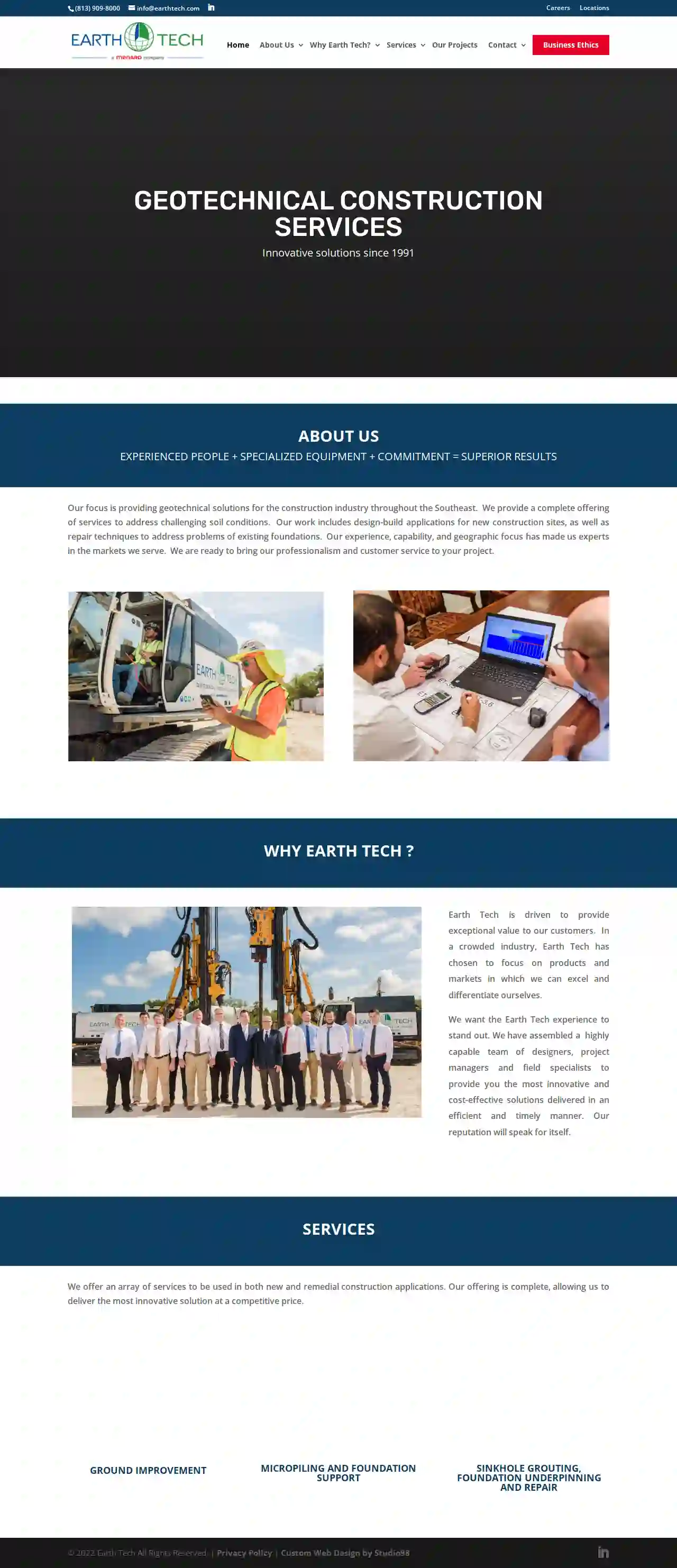
Earth Tech
York, USAbout Us Earth Tech is a leading provider of geotechnical construction services in the southeastern United States. We specialize in ground improvement, foundation support, and sinkhole remediation. Our team of experienced engineers, project managers, and field technicians is committed to providing our clients with the highest quality services and solutions. Company History Earth Tech was founded in 1991 by Ron Broadrick, a veteran of the geotechnical construction industry with over 40 years of experience. Ron’s vision was to create a company that would provide innovative and reliable solutions to the challenges faced by developers, engineers, and homeowners in Florida and beyond. Since its inception, Earth Tech has grown into one of the largest and most respected geotechnical construction companies in the state, with a reputation for quality, safety, and customer service. Menard Leadership Earth Tech is a proud member of the Menard USA family of companies. Menard USA is a leading provider of geotechnical construction services in North America. With a shared commitment to innovation, quality, and customer service, Earth Tech and Menard USA are working together to provide our clients with the best possible solutions. Why Earth Tech? Earth Tech is the premier choice for geotechnical construction services in the southeastern United States. We offer a wide range of services, including: Ground improvement Foundation support Sinkhole remediation Design and value engineering Project resources We are committed to providing our clients with the highest quality services and solutions. Our team of experienced engineers, project managers, and field technicians is dedicated to exceeding your expectations. Safety & Quality Safety is our top priority. We are committed to providing a safe and healthy work environment for our employees and the public. We have a comprehensive safety program that includes regular training, safety audits, and incident reporting. We are also committed to providing our clients with the highest quality services. We use only the best materials and equipment, and our team of experienced professionals is dedicated to delivering projects on time and within budget. Local Focus and Experience Earth Tech is a locally owned and operated company. We are committed to serving our community and providing our clients with the best possible service. We have a deep understanding of the local soil conditions and regulatory requirements, which allows us to provide our clients with the most effective and cost-efficient solutions. Design and Value Engineering Earth Tech has a team of experienced engineers who can provide design and value engineering services for your project. We can help you to develop the most cost-effective and sustainable solutions for your needs. Project Resources Earth Tech has a wide range of resources available to our clients, including: Experienced engineers Project managers Field technicians Specialty equipment Grout material production We are committed to providing our clients with the resources they need to ensure the success of their projects.
- Services
- Why Us?
- Our Team
- Testimonials
- Gallery
Get Quote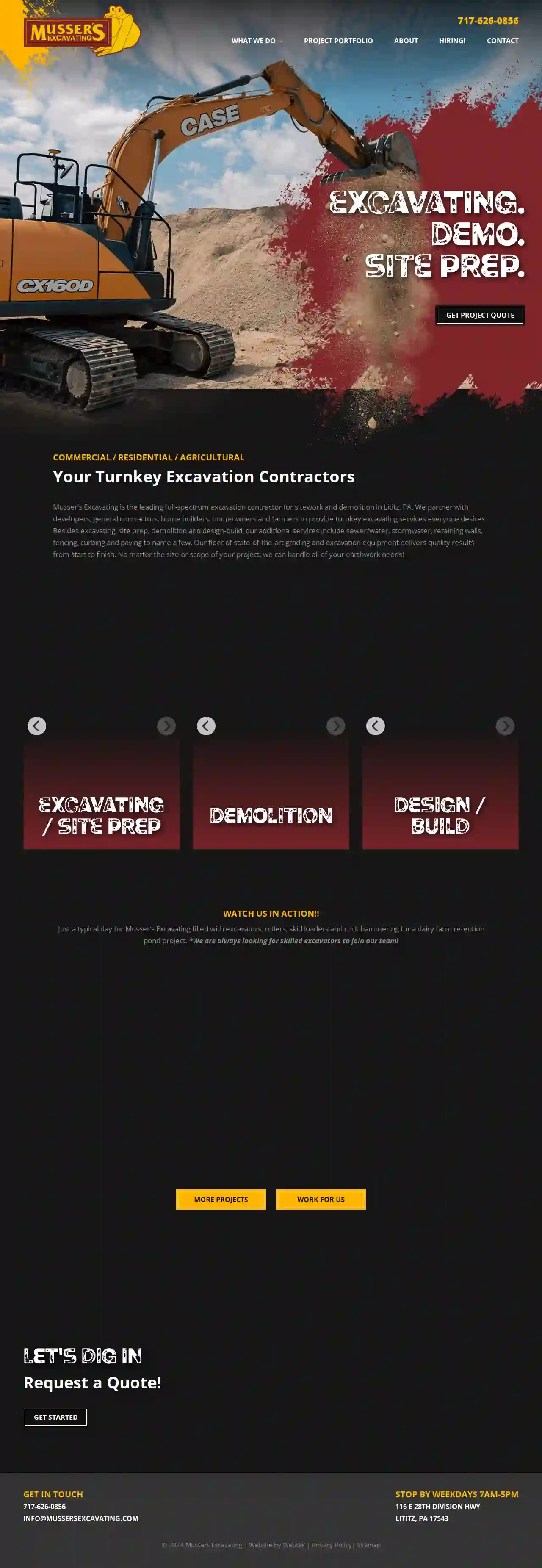
Musser's Excavating
4.85 reviews116 E 28th Division Hwy, Lititz, 17543, USMusser’s Excavating: Your Turnkey Excavation Contractors Musser’s Excavating is the leading full-spectrum excavation contractor for sitework and demolition in Lititz, PA. We partner with developers, general contractors, home builders, homeowners and farmers to provide turnkey excavating services everyone desires. Besides excavating, site prep, demolition and design-build, our additional services include sewer/water, stormwater, retaining walls, fencing, curbing and paving to name a few. Our fleet of state-of-the-art grading and excavation equipment delivers quality results from start to finish. No matter the size or scope of your project, we can handle all of your earthwork needs!
- Services
- Why Us?
- Gallery
Get Quote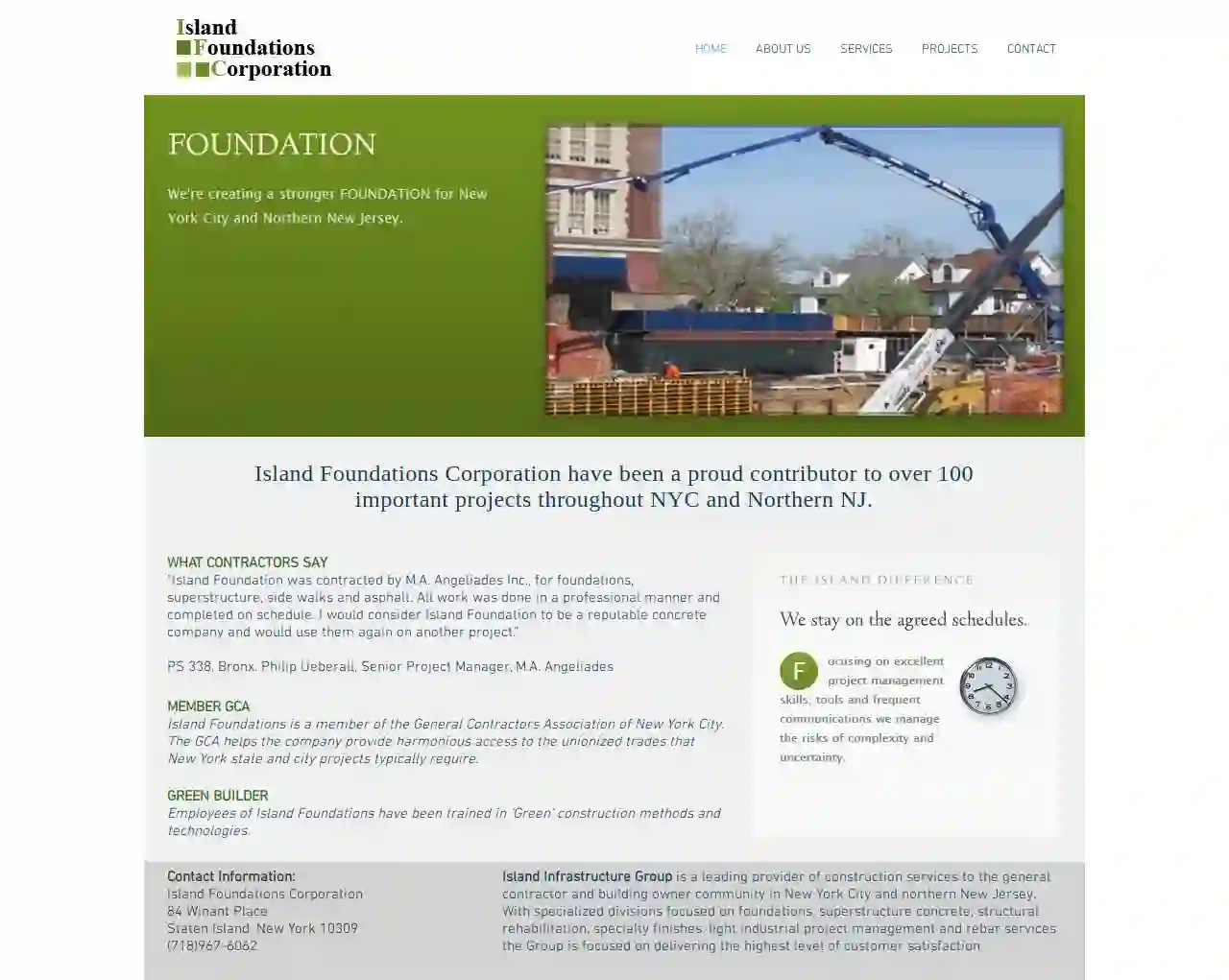
Island Foundations Corporation
54 reviews84 Winant Place, Staten Island, 10309, USIsland Foundations Corporation Island Foundations Corporation has been a proud contributor to over 100 important projects throughout NYC and Northern NJ. We are a leading provider of construction services to the general contractor and building owner community in New York City and northern New Jersey. With specialized divisions focused on foundations, superstructure concrete, structural rehabilitation, specialty finishes, light industrial project management and rebar services, we are focused on delivering the highest level of customer satisfaction. Our team is comprised of experienced professionals who are dedicated to providing our clients with the highest quality workmanship and service. We are committed to safety, quality, and on-time delivery. We are also committed to being a good neighbor and contributing to the communities in which we work. We are a member of the General Contractors Association of New York City (GCA). The GCA helps us provide harmonious access to the unionized trades that New York state and city projects typically require. Our employees have been trained in ‘Green’ construction methods and technologies.
- Services
- Why Us?
- Testimonials
- Gallery
Get Quote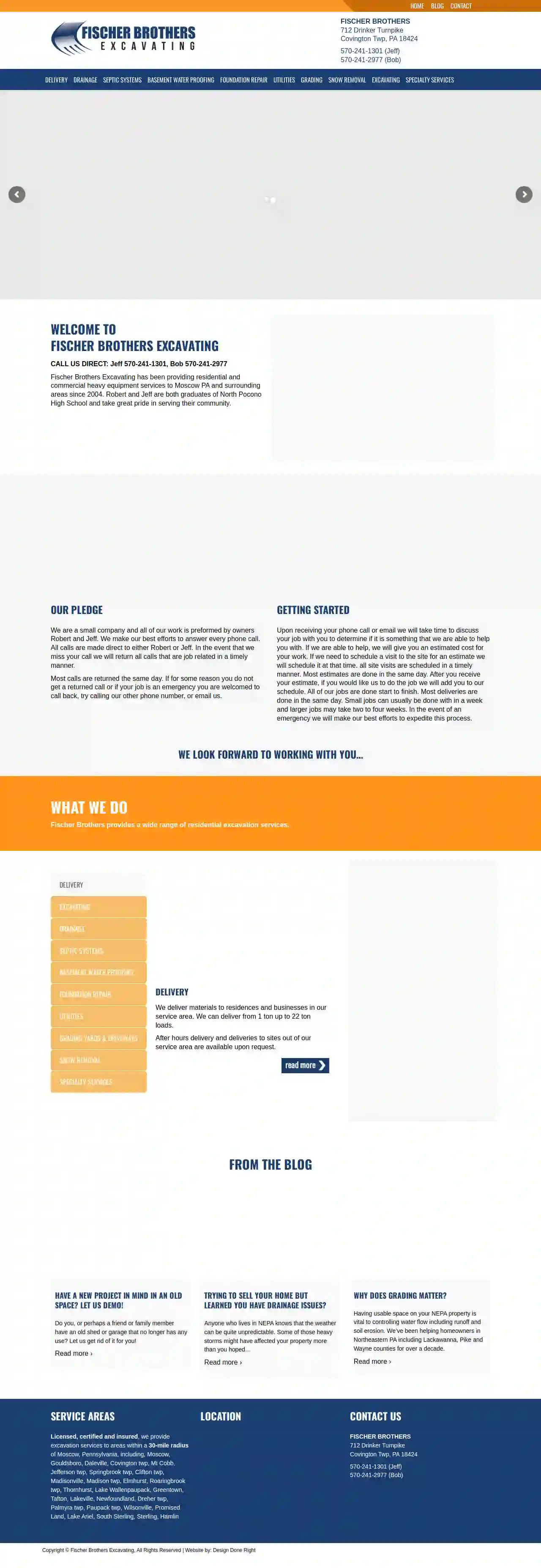
Fischer Brothers Excavating
519 reviews712 Drinker Turnpike, Covington Twp, 18424, USWelcome to Fischer Brothers Excavating, a small company providing residential and commercial heavy equipment services to Moscow PA and surrounding areas since 2004. Robert and Jeff, both graduates of North Pocono High School, take great pride in serving their community. We are a family-owned business, and all of our work is performed by owners Robert and Jeff. We make our best efforts to answer every phone call, and most calls are returned the same day. If you have a job that requires excavation services, we will take the time to discuss your project with you to determine if we are able to help. If we are able to help, we will give you an estimated cost for your work. We offer a wide range of services, including delivery, excavating, drainage, septic systems, basement water proofing, foundation repair, utilities, grading, snow removal, and specialty services. We are licensed, certified, and insured, and we provide excavation services to areas within a 30-mile radius of Moscow, Pennsylvania.
- Services
- Why Us?
- Our Team
- Gallery
Get Quote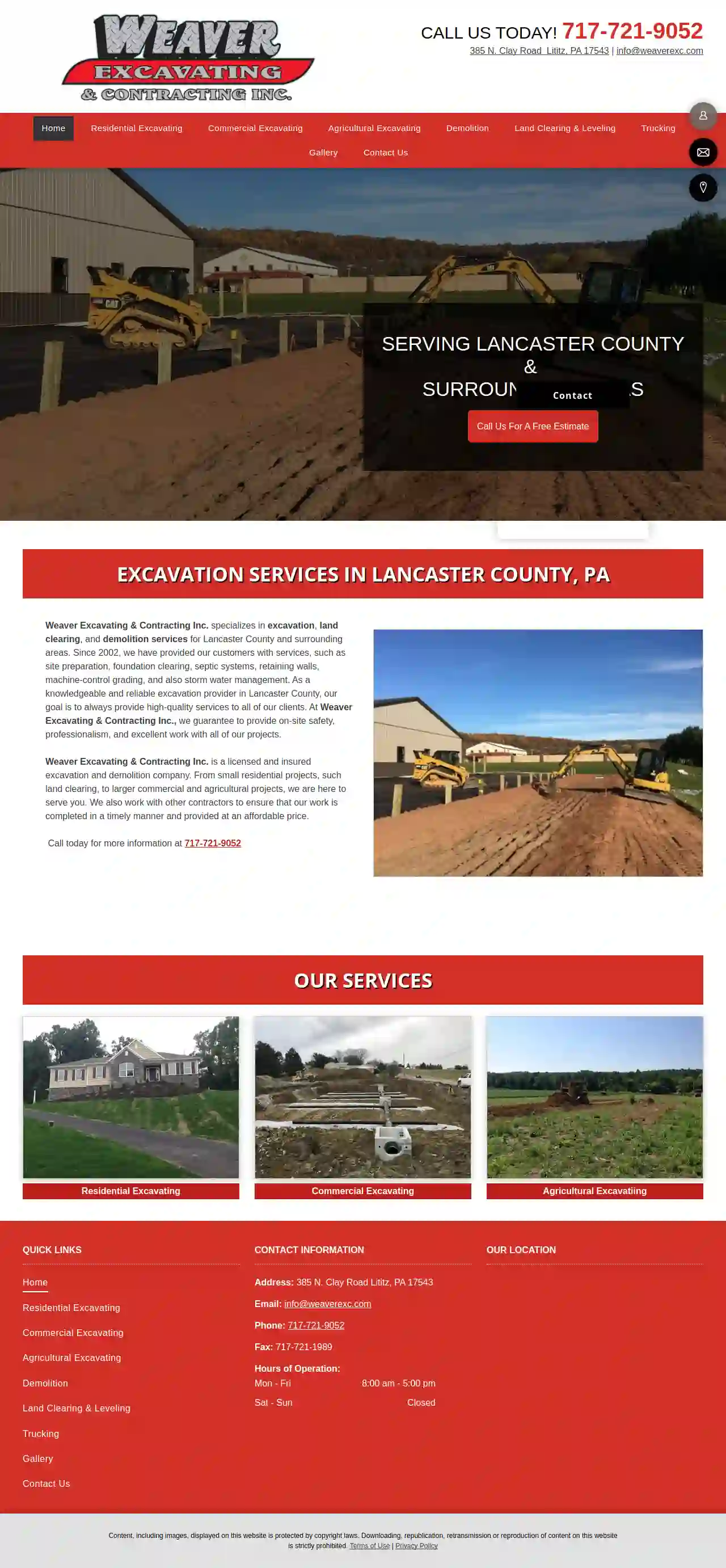
Weaver Excavating & Contracting Inc
54 reviews385 N. Clay Road, Lititz, 17543, USWeaver Excavating & Contracting Inc. is your trusted partner for all your excavation needs in Lancaster County and surrounding areas. Since 2002, we've been providing high-quality excavation, land clearing, and demolition services to both residential and commercial clients. Our team of experienced professionals is dedicated to delivering exceptional results, ensuring your project is completed on time and within budget. We understand the importance of safety and professionalism on every job site. That's why we are fully licensed and insured, and we always prioritize safety for our team and your property. Whether you need site preparation, foundation clearing, septic system installation, retaining walls, machine-control grading, or storm water management, we have the expertise and equipment to handle any project, big or small. We also work closely with other contractors to ensure seamless project coordination and timely completion. Our commitment to quality and customer satisfaction has earned us a reputation as a reliable and trustworthy excavation provider in Lancaster County. Contact us today for a free estimate and let us help you bring your vision to life.
- Services
- Why Us?
- Gallery
Get Quote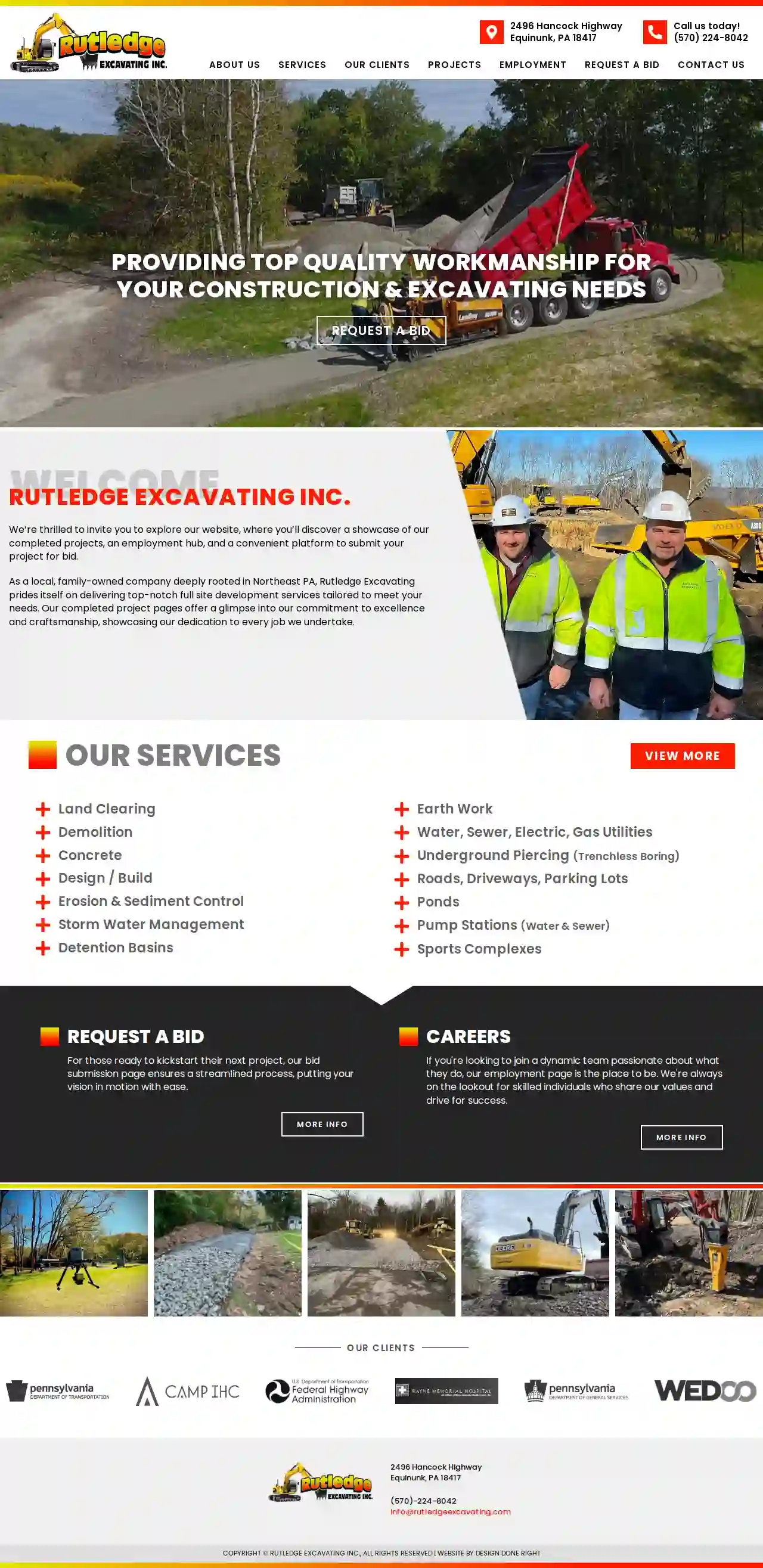
Rutledge Excavating Inc.
3.56 reviews2496 Hancock Highway, Equinunk, 18417, USWELCOME RUTLEDGE EXCAVATING INC. We’re thrilled to invite you to explore our website, where you’ll discover a showcase of our completed projects, an employment hub, and a convenient platform to submit your project for bid. As a local, family-owned company deeply rooted in Northeast PA, Rutledge Excavating prides itself on delivering top-notch full site development services tailored to meet your needs. Our completed project pages offer a glimpse into our commitment to excellence and craftsmanship, showcasing our dedication to every job we undertake. OUR SERVICES View More Land Clearing Demolition Concrete Design / Build Erosion & Sediment Control Storm Water Management Detention Basins Earth Work Water, Sewer, Electric, Gas Utilities Underground Piercing (Trenchless Boring) Roads, Driveways, Parking Lots Ponds Pump Stations (Water & Sewer) Sports Complexes REQUEST A BID For those ready to kickstart their next project, our bid submission page ensures a streamlined process, putting your vision in motion with ease. MORE INFO CAREERS If you're looking to join a dynamic team passionate about what they do, our employment page is the place to be. We're always on the lookout for skilled individuals who share our values and drive for success. MORE INFO
- Services
- Why Us?
- Gallery
Get Quote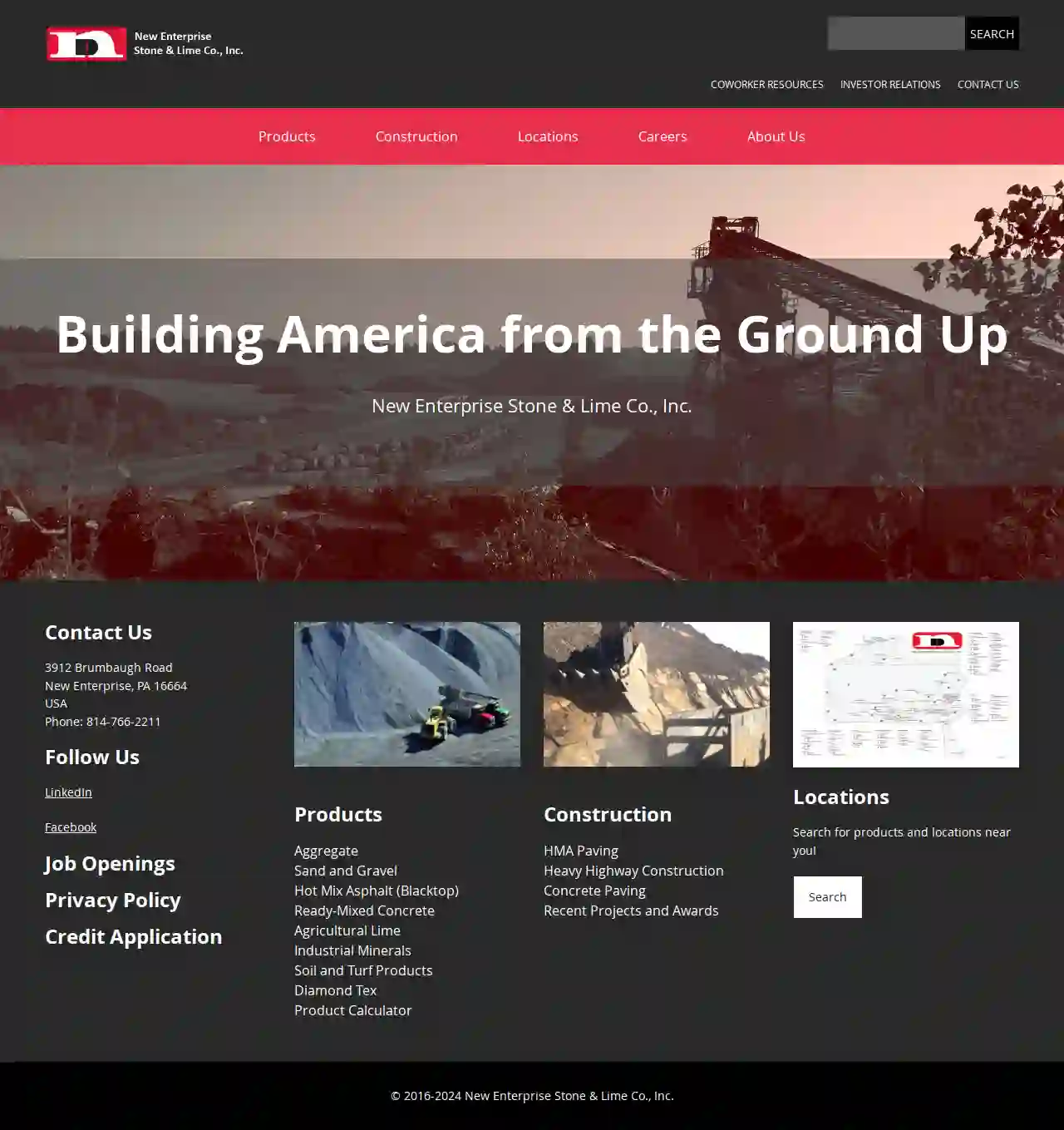
New Enterprise Stone & Lime
4.33 reviews3912 Brumbaugh Road, New Enterprise, 16664, USBuilding America from the Ground Up New Enterprise Stone & Lime Co., Inc. (NESL) is a leading provider of construction materials and services in Pennsylvania and Western New York. For over 100 years, we have been committed to providing our customers with high-quality products and services that meet their needs. We are proud to be a part of the communities we serve and are dedicated to building a better future for all. Our Mission Our mission is to provide our customers with the highest quality construction materials and services, while maintaining a commitment to safety, environmental responsibility, and community involvement. Our History NESL was founded in 1912 by a group of local entrepreneurs who saw the need for a reliable source of construction materials in the region. Since then, we have grown into a leading provider of construction materials and services, with a reputation for quality, reliability, and customer service. Our Team Our team is made up of experienced professionals who are dedicated to providing our customers with the best possible service. We are committed to providing our employees with the training and resources they need to succeed. Our Values Our values are the foundation of our success. We are committed to: Safety Quality Customer Service Environmental Responsibility Community Involvement
- Services
- Why Us?
- Gallery
Get Quote
David H. Martin Excavating, Inc.
4.350 reviews4961 Cumberland Highway, Chambersburg, 17202, USYour Complete Excavating Solution Your projects deserve a reliable partner in delivering highly trained and trusted excavation solutions for jobs of any size. Our highly trained team is equipped with the skills and capabilities designed for residential homeowners to commercial project managers. Excellence & Integrity We understand the frustrations that arise with extended project completion dates, unexpected costs, and uncommunicative teams. Excellence and integrity are at the core of everything we do—it’s not just what we do, but the foundation for all that we are. Expect your project to be completed and on time—everytime.
- Services
- Why Us?
- Our Team
- Testimonials
Get Quote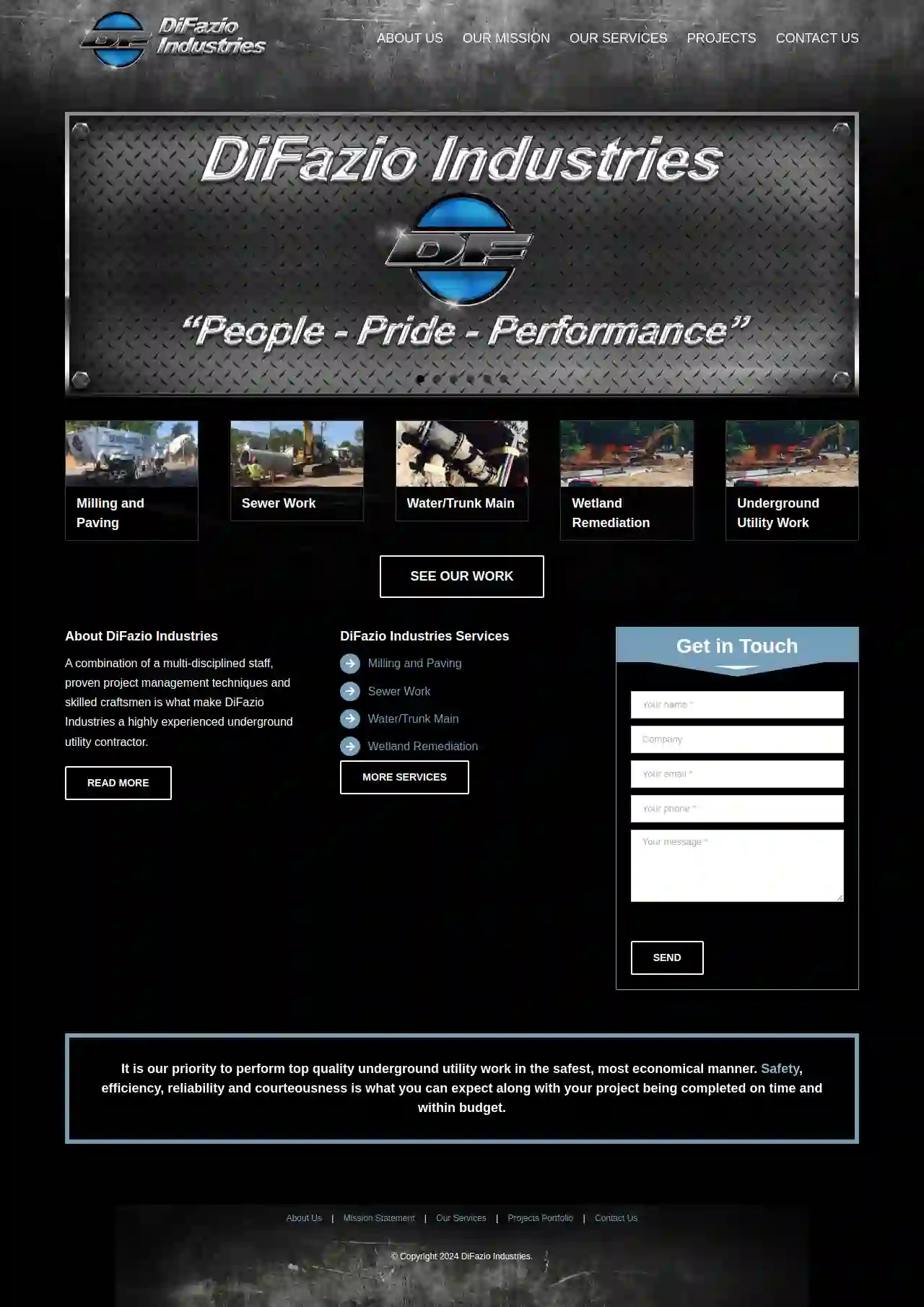
DiFazio Industries
4.119 reviews38 Kinsey Place, Staten Island, 10303, USAbout DiFazio Industries For over 40 years, DiFazio Industries has served the five boroughs of New York City as a contractor. It is our priority to perform top quality work in the safest, most economical manner. People, Pride and Performance; this is how we built our business. It is an important statement of fact and a promise to our future. Our multi-disciplined staff takes pride in every project and are committed to performing work in an efficient, safe and professional manner. Award-winning DiFazio Industries has experience in a wide variety of construction development projects with clients that include public utilities, private industry, and government agencies. With over 40 years of experience in construction, our multi-disciplined team of professionals and skilled craftsman, combined with proven project management techniques is what makes DiFazio a cut above the rest. Safety, efficiency, reliability and courteousness is what you can expect along with your project being completed on time and within budget.
- Services
- Why Us?
- Gallery
Get Quote
Over 22,076+ Excavation Contractors in our network
Our excavation contractors operate in North Lebanon and surroundings!
ExcavationHQ has curated and vetted the Best Excavation Contractors arround North Lebanon. Find the most trustworthy contractor today.
Frequently Asked Questions About Demolition Contractors
- Project Assessment: The demolition contractor evaluates the structure, site conditions, and project requirements.
- Permitting: Obtain necessary demolition permits from local authorities.
- Site Preparation: Secure the site, disconnect utilities, and remove any valuable or reusable items.
- Hazardous Material Abatement: Professionally remove asbestos, lead paint, or other hazardous materials if present.
- Demolition: Execute the chosen demolition method, bringing down the structure safely and efficiently.
- Debris Removal and Site Cleanup: Sort, process, and dispose of demolition debris responsibly. Clean up the site to prepare it for future use.
- Enclosure: Sealing off the asbestos-containing material to prevent fiber release.
- Encapsulation: Coating the asbestos-containing material with a sealant to bind the fibers.
- Removal: Carefully removing the asbestos-containing material and disposing of it safely.
What is asbestos abatement?
What are the steps involved in a typical demolition process?
What are the different methods of asbestos abatement?
How can I tell if my building contains asbestos?
What is asbestos abatement?
What are the steps involved in a typical demolition process?
- Project Assessment: The demolition contractor evaluates the structure, site conditions, and project requirements.
- Permitting: Obtain necessary demolition permits from local authorities.
- Site Preparation: Secure the site, disconnect utilities, and remove any valuable or reusable items.
- Hazardous Material Abatement: Professionally remove asbestos, lead paint, or other hazardous materials if present.
- Demolition: Execute the chosen demolition method, bringing down the structure safely and efficiently.
- Debris Removal and Site Cleanup: Sort, process, and dispose of demolition debris responsibly. Clean up the site to prepare it for future use.
What are the different methods of asbestos abatement?
- Enclosure: Sealing off the asbestos-containing material to prevent fiber release.
- Encapsulation: Coating the asbestos-containing material with a sealant to bind the fibers.
- Removal: Carefully removing the asbestos-containing material and disposing of it safely.